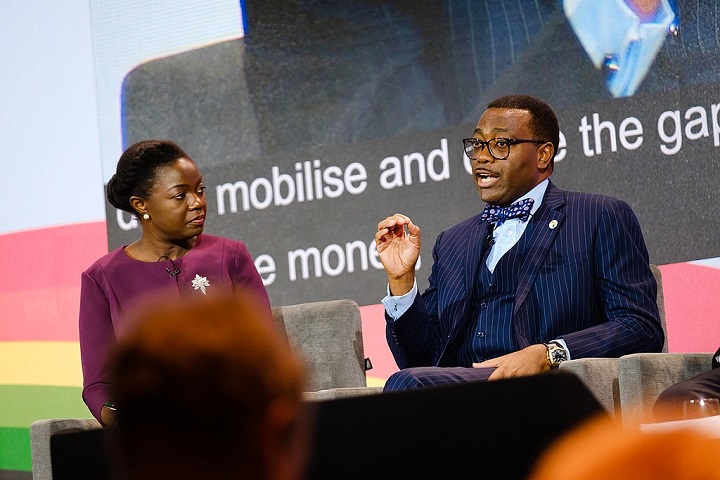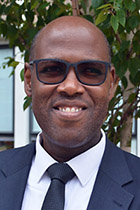Has the African Development Bank lost its African character?


 This blog post has been written by Prof. Chibuike Uche and Dr André Leliveld. Chibuike Uche is the chairholder of the Stephen Ellis Chair for the Governance of Finance and Integrity in Africa at Leiden University. André Leliveld is a development economist and senior researcher at the ASCL. Since 2014 he is Associate Director of the Leiden-Delft-Erasmus Centre for Frugal Innovation in Africa.
This blog post has been written by Prof. Chibuike Uche and Dr André Leliveld. Chibuike Uche is the chairholder of the Stephen Ellis Chair for the Governance of Finance and Integrity in Africa at Leiden University. André Leliveld is a development economist and senior researcher at the ASCL. Since 2014 he is Associate Director of the Leiden-Delft-Erasmus Centre for Frugal Innovation in Africa.
On 22 May 2020, US Treasury Secretary Steven Mnuchin made an extraordinary move by asking the Board of the African Development Bank (AfDB) to revisit its decision that cleared the Bank’s president, Nigerian born Akinwumi Adesina, of all the sixteen allegations of nepotism, engagement in politics and corruption leveled against him by unknown whistleblowers. The US is the largest non-African shareholder of the Bank. The above Board decision was based on the report of its Ethics Committee chaired by its Japanese Executive Director in the Bank, Takuji Yano. Norway, Sweden, Denmark, and Finland swiftly queued behind the US. It is also instructive that this request is coming a few months after the current president of the World Bank, David Malpass, who was nominated by the US Government, accused the AfDB of being too quick to lend to African countries and in the process contributing to the African debt crisis.
Getting a second term as Bank president
Mr Adesina has dismissed this move as a ploy by the US to sabotage his bid to get a second term as president of the Bank in August. This privilege has been enjoyed by the three consecutive presidents that held the position before Mr Adesina. Mr Adesina has also been endorsed by the Executive Council of the African Union for the job. It is therefore not surprising that he is the sole candidate for the position that under AfDB rules must be occupied by an African.
While the US insists that the reinvestigation of the matter will enhance governance and confidence in the Bank, supporters of Mr Adesina argue that the cardinal sin of Mr Adesina is his independence, as demonstrated by his refusal to take sides in the current contestation for the dominance of the African economic space between China and the US. One of Mr Adesina’s strongest supporters is Nigeria’s former president Olusegun Obasanjo, who is now rallying many former African presidents in the continent to support Mr Adesina. According to Mr Obasanjo, the unprecedented request by the US Secretary of Treasury for an independent investigation is outside the rules, law procedures, and governance system of the Bank. Supporting Mr Adesina is therefore essential to prevent the Bank’s governance from being hijacked away from Africa. The Nigerian Government, which is the largest shareholder in the Bank, is also supporting Mr Adesina.
Overdependence on non-Africa shareholders
Whatever the reason may be, the current intervention by the US Treasury is further evidence of the widespread influence of non-African countries in the AfDB. This is correlated with the overdependence of the Bank on the financial generosity of its non-African shareholders which currently own 41.1 percent of the Bank’s capital. Perhaps more important is the fact that these non-African shareholders are the dominant donors to the African Development Fund, which is replenished every three years and is the most liquid window for the operations of the Bank.
It is such financial influence that has informed the sometimes awkward decision by this flagship African Institution to every now and then hold its Annual General Meeting in faraway countries like India, China, Spain, South Korea and Portugal. Surely, what African countries gain from hosting such events in countries that have little political, social, and economic affinity with Africa in no way compares with the financial and psychological costs incurred in moving delegates from 54 African countries and the AfDB to such destinations.
Established for the rapid development of the continent
The above examples of foreign influence and/or interference in the operations of the AfDB raises several questions. This is especially so given the fact that the Bank was established in 1964 with the main purpose of providing a more efficient funding model for Africa. Specifically, the AfDB was introduced by newly independent African countries eager to develop because it was widely believed in Africa at the time that the World Bank was not doing enough to facilitate the rapid development of the continent. Africans were therefore determined to create a development Bank that would have an African character. This was defined to mean a Bank that would be purely African in its ideas, ideals, administration, and capital. The idea was to ensure that the Bank was not contaminated with external influences that would be detrimental to the interest of Africa.
It was based on the above that it was determined from the formation stage that the shareholding in the Bank was open to only African member countries and that the president of the Bank must always be an African. Capital exporting countries were however encouraged to participate in the Special Fund established by the AfDB agreement preferably on a multilateral and untied basis.
Yet, potential donors were reluctant to participate in this Special Fund, unless they were also granted shareholder status. The African Development Fund (ADF) was nevertheless set up in 1972. At inception, the donations to the ADF were coordinated under the Development Assistance Committee of the OECD. This ensured that the donors had a united front in their negotiations. One area they insisted on was that their economic interests must be protected when their ADF donations are being spent. Along these lines, Article 15 (4) of the ADF Agreement explicitly stated that the proceeds of the Fund “shall be used only for procurement in the territories of State participants or members, of goods produced in and services supplied from the territories of State participants or members.” Such regulation could arguably encourage donor countries to push for intervention in areas that will help promote their exports rather than in those required by Africans.
Opening up shareholding to non-African countries
Before the admission of non-African countries as shareholders of the AfDB in 1982, the ADF remained relatively small as donors insisted that the African shareholders of the Bank should be the major funders of the Bank. Given the widespread poverty in Africa, it was not surprising that the financial problems of the AfDB persisted. Attempts by the Bank to raise money in the private international money market was also not very successful because of the poor credit ratings of the majority of its shareholder African countries. The Bank was therefore still in need of additional capital. It was under the above circumstance that the Bank was forced to open up its shareholding to non-African countries.
From an initial allocation of 33.33%, the Bank now has 41.1 percent of its shares controlled by such non-African member countries. It was only after the admission of non-African countries to the shareholding of the AfDB that the contributions of such countries to the ADF materially increased. In 2019, for instance, donors agreed on the 15th replenishment of the ADF (2020-2022) by pledging to contribute $7.6 billion to the Fund.
Based on the above, the minority shareholding by non-African member states is at best symbolic. The reality is that they are the most important stakeholders. This is because the ADF now represents the major source of capital for the Bank’s operations. It is for instance much larger than the entire called-up capital of the Bank. Although the total authorized share capital of the Bank has recently been increased to $208 billion, an increase of $115 billion from its previous level, historically, less than 7.5 percent of the Bank’s authorized capital is required to be paid up. The vast majority of the authorized capital is classified as callable capital that could be demanded in the event of an emergency.
Very good credit ratings
The callable portion of the Bank capital, especially the part that belongs to the non-African members of the AfDB, however helps to ensure that the Bank has very good credit ratings. This has greatly enhanced the ability of the Bank to raise money in the international financial market. In addition, the ADF also absorbs most of the operational costs of the Bank Group. At the very least, the aid given to African countries through ADF replenishments helps to sustain the mind-blowing salaries and allowances which have been inadvertently exposed by the whistleblower petition, and which are routinely paid out to staff members of this Bank - which ironically is supposed to be the flagship institution for aiding the development of the poorest continent in the world. It is therefore difficult to imagine how the AfDB will continue to operate in its current form without the non-regional member countries and the AfDB.
Based on the above, it is clear that the most important power block within the AfDB when it comes to determining its continued survival and future health is the non-African member countries of the Bank. It is this reality that will determine if Mr Adesina gets a second term as president of the AfDB. This scenario was no doubt what the founders of the AfDB worked very hard to prevent.
Support or sacrifice Adesina?
Now that the gloves are off, African countries must choose between supporting or sacrificing Mr Adesina. If they support him, they risk losing the support and membership of the US and some of their allies of the AfDB and the ADF. Aside from losing some of the free ADF money that comes from such members, the Bank also risks losing its excellent credit rating which enables it to participate actively in the global financial market. If, however, they decide to sacrifice Mr Adesina, then the status quo will likely remain. The deeper question that should guide Africa’s position in this conflagration is: what is the utility value of the present foreign-aid dependent AfDB for Africa’s development - and is this status quo desirable?
Would you like to stay updated on new blog posts in the ASCL Africanist Blog? Subscribe here! Would you like to comment? Please do! The ASCL reserves the right to edit, shorten or reject submitted comments.
Photo: Dr Akinwumi Adesina, president African Development Bank, speaking at the UK-Africa Investment Summit, London, 20 January 2020. Credit: Graham Carlow, DFIC / CC BY


Add new comment